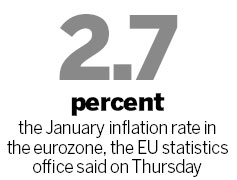EU inflation rises, output drops
Updated: 2012-03-02 07:55
(China Daily)
|
|||||||||||
Rising energy costs threaten to further weaken region's economy
ZURICH / BRUSSELS - European inflation accelerated in February while manufacturing output contracted as political tensions in the Middle East boosted oil prices even as the economy heads into a recession.
The inflation rate in the 17-nation eurozone rose to 2.7 percent from 2.6 percent in January, the European Union's statistics office in Luxembourg said in an initial estimate on Thursday.
Unemployment rose to 10.7 percent in January, a 14-year high, it said in a separate report.
Manufacturing output contracted for a seventh month in February as the eurozone economy struggles to rebound from a contraction in the fourth quarter.
A manufacturing gauge based on a survey of purchasing managers in the 17-nation eurozone rose to 49, a six-month high, from 48.8 in January, the London-based Markit Economics said on Thursday. That's in line with a preliminary estimate on Feb 22. A reading below 50 indicates contraction.
Manufacturers may see waning sales growth as EU governments toughen spending cuts just as global demand weakens.
 |
Europe's economy may struggle to gather strength after shrinking in the fourth quarter as governments from Italy to Greece step up budget cuts, undermining hiring and consumer demand. While crude-oil prices have increased about 23 percent over the past year, companies may find it difficult to raise prices in coming months, economists said.
"Oil-price developments will be a key factor in future eurozone consumer-price developments," Howard Archer, chief European economist at IHS Global Insight in London, said before Thursday's reports.
"But the likelihood remains that weakened economic activity and high and rising unemployment should generally limit underlying price pressures," he said.
The eurozone economy may shrink 0.3 percent this year after expanding 1.4 percent in 2011, the European Commission said on Feb 23.
While Germany's economy, Europe's largest, is seen growing 0.6 percent in 2012, the commission projected contractions for Belgium, Greece, Spain, Italy, Cyprus and the Netherlands.
Rising energy costs threaten to further weaken the region's economy by sapping the purchasing power of companies and consumers.
Oil prices have increased in recent months on the concern that sanctions against Iran will disrupt supplies from the second-largest producer in the Organization for Petroleum Exporting Countries.
Ewald Nowotny, a council member at the European Central Bank, said at a conference on Tuesday that "disturbing developments in the Middle East" could fuel eurozone inflation.
"That could make life a bit more difficult," he said.
The ECB cut borrowing costs twice in the fourth quarter, bringing the benchmark rate to 1 percent, matching a record low, to bolster the economy.
The Frankfurt-based central bank will publish its latest inflation projections when council members meet on March 8. In December, it forecast that inflation will slow to 2 percent this year from 2.7 percent in 2011.
The statistics office is scheduled to release a breakdown of February consumer prices later this month. Core inflation, which excludes volatile costs such as energy, in the eurozone slowed to 1.5 percent in January from 1.6 percent in December.
Bloomberg News
Today's Top News
President Xi confident in recovery from quake
H7N9 update: 104 cases, 21 deaths
Telecom workers restore links
Coal mine blast kills 18 in Jilin
Intl scholarship puts China on the map
More bird flu patients discharged
Gold loses sheen, but still a safe bet
US 'turns blind eye to human rights'
Hot Topics
Lunar probe , China growth forecasts, Emission rules get tougher, China seen through 'colored lens', International board,
Editor's Picks

|

|

|

|

|

|





